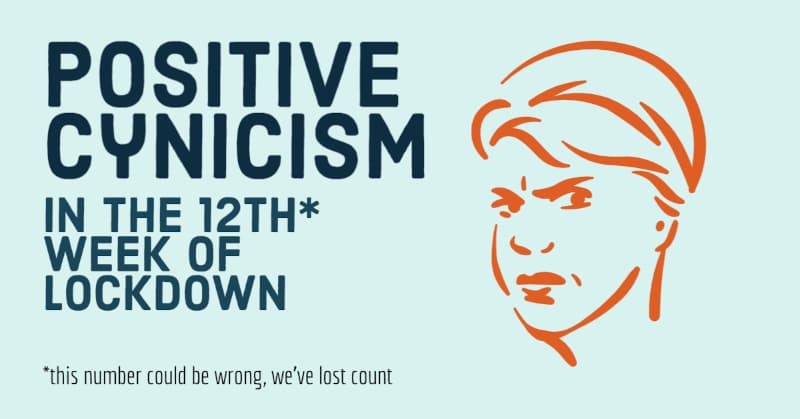2nd November 2021

Did you enter the month of August as a whimsical, happy romantic who always stopped to smell the roses? Were you full of the zest of life, waking up and singing with the morning birdsong before embarking on a pre-work morning stroll?
Yes, I hear you cry.
And now, in the fullness of October, more than 65 days into lockdown, do you find yourself looking back on those days, shaking your head in exasperation and sighing at your naive foolishness, your well-meaning but clearly misplaced joy at life?
Have you perhaps slipped into a more cynical frame of mind? Perhaps you have. And perhaps this worries you slightly. After all, you were always brought up to believe that cynicism is something practised by a wizened old hermit, who’s forgotten how to speak and merely grunts and shakes his fist at the sky, in a permanent state of despair and loathing.
Fear not.
While this isn’t far off, and perhaps an apt description of how we’re all feeling at the moment, there is a phenomenon known as positive cynicism, a potentially more digestible approach to the school of thought.
What is cynicism?
Traditional cynicism is an attitude often characterised by a general distrust of others - including people, establishments, institutions, media and authorities.
Cynics are usually inclined to believe that most other people are acting purely out of self-interest and, at heart, they’re untrustworthy - at least, according to the dictionary (and Google).
Take a closer look at the philosophy and you’ll learn that the principles centre around freeing people from the smokescreen of falsehoods, mindlessness, conceit and deceit. Once the individual achieves lucidity and mental freedom, they’re free to achieve eudaimonia, the Greek term to describe a state of good spirit or happiness.
In simpler terms? A cynical approach helps to free you from delusion which clouds your thinking. With the mental clarity that comes with this, you’re left free to live a life unscathed by others’ self-interest.
The ancient Cynics emerged from Ancient Greece, many of which were students under Antisthenes, himself a former student of Socrates. This group of merry cynics took immense pleasure in bluntly pointing out the foolishness of those around them. If someone appeared pretentious, materialistic, or pompous, the Cynics would jeer and point fingers at them. While we’re less likely to publicly jeer in the streets of Auckland, this approach must have been somewhat cathartic for the ancient group. Certainly pointing and jeering at anti-lockdown protestors might have a helpful effect.
Contemporary cynics may engage in less conspicuous behaviour, but are no less sarcastic and disillusioned.
Why a cynical mindset might not be so bad
There’s a certain gleam of power when it comes to negative thinking. While we’re told frequently to engage in optimistic, glass-half-full perspectives, many scholars have regarded negative thinking as more realistic, leading to greater fulfilment and happiness.
While positive cynicism reads like an oxymoron, it’s a tried and tested school of thought that we could all benefit from - especially in the midst of a pandemic. In a nutshell, positive cynicism is the idea that cynicism can be used as a positive mentality that helps shed light and clarity on the world around you, so that you may go forward, sharply differentiating between what truly matters and the clutter and noise of everyday life.
By remaining cynical of the world around you, you’re less easily persuaded by any media you consume. You remain in control of how you think and retain a degree of critical thinking that ensures nothing you consume is taken at face value.
Cynicism should be treated as a starting point, to clear the nonsense of life out of your mind so that you clarify your own values and move forward with intention. Cynicism should not be an excuse to treat other people badly or completely give up on life altogether (see: nihilism). In this sense, you should aim to be cynical in your thinking so that you can be idealistic in your actions.
.jpg?width=800&name=cynicism%202%20(2).jpg)
Without a doubt, positive cynicism has been a catalyst for many key events in history. Whistleblowers and those who dare question the status quo are all examples of cynics. The uncovering of the Watergate scandal, John Oliver’s show and even Jesus' anti-institution teachings are all examples of positive cynicism gone right.
Be cynical in your thinking and idealistic in your actions. Being deliberately cynical in your actions could lead you to treat others poorly or deceive them in order to further your own success. This is not positive cynicism. Positive cynicism keeps you in a constant state of healthy, critical thinking. You never take everything at face value, but instead, consider various perspectives.
True pessimists believe that nothing can improve and that things can only get worse. True optimists are the opposite. A cynic fits in neither category and in fact prefers to steer clear of the black and white thinking that divides and categorises entire populations as either optimists or pessimists.
The positive cynic also values self-sufficiency to reduce our reliance on the external. While we might wish to live a life that’s light and joyful, promoting free-spending and buying more to ‘treat ourselves’, we’re actually fuelling the dark underbelly of consumerism that’s transfixed our Western civilisation. A cynic rejects the notion of consumerism and instead relies on themself to feel fulfilled - which actually creates that sense of lightness and joy that we mistakenly tend to associate with consumption.
Radical acceptance
Positive cynicism is incredibly freeing. With a carefully considered distrust of others’ - taking into account context - you begin to drop your lofty expectations and sky-high ideals.
You accept your own flaws and dark side. Let’s face it, none of us are perfect. We get irritable, we snap at our partner after a heavy day, and in all honesty - sometimes we don’t put the trolley back in the right place at the supermarket. Who can blame us? That’s life.
By acknowledging how flawed we all are, we avoid being hypocritical when we call out the disenchanting, disappointing world around us. Instead of developing a superiority complex calling other people out for acting in their self-interest, when we call them out as cynics, we only do so to remind them not to get ahead of themselves - because the cold, hard reality of life is that we’re all flawed to some extent.
In fact, some people argue that we’re always inherently selfish. Everything we do is out of self-interest, how can it not be? Even if we do a seemingly selfless act, we still feel good when we do it - that’s often the tagline for selflessness to convince people to perform a ‘random act of kindness’ - simply because it feels good. We’re motivated by the desire to feel good.
In this sense, positive cynicism can guide us through life in three easy steps:
- 1. Accepting our own nature - flaws and strengths together
- 2. Accepting the flawed nature of others - and the notion that we’re mostly acting in our self-interest
- 3. Strategise and live life working with peoples’ nature in mind, rather than against it.=
Once we adopt a positively cynical outlook on life, we’ll be free of the mental clutter of conformity which leaves us space to focus on what we really want to do - beyond the delusion.
Final Words:
We can’t make things better until we truly understand the extent of how terrible they are.
When it comes to lockdown, perhaps this advice might help you perceive the situation differently and help you to get through the endless weeks. If we wholeheartedly accept the challenges of our current situation, laugh at it and move forward knowing that everyone’s a little bit rough around the edges, we’re likely to feel one degree better.
Better than nothing.
Give it a go. Or don’t. I’m not delusional enough to assume that this article will resonate with anyone.







